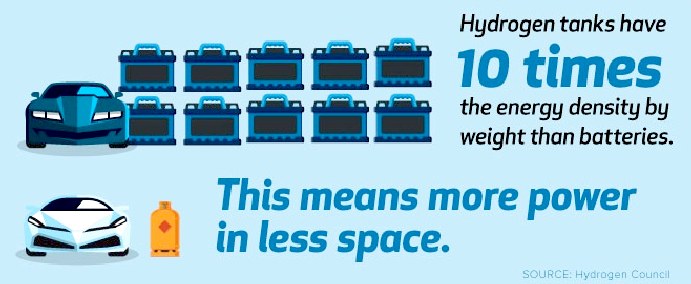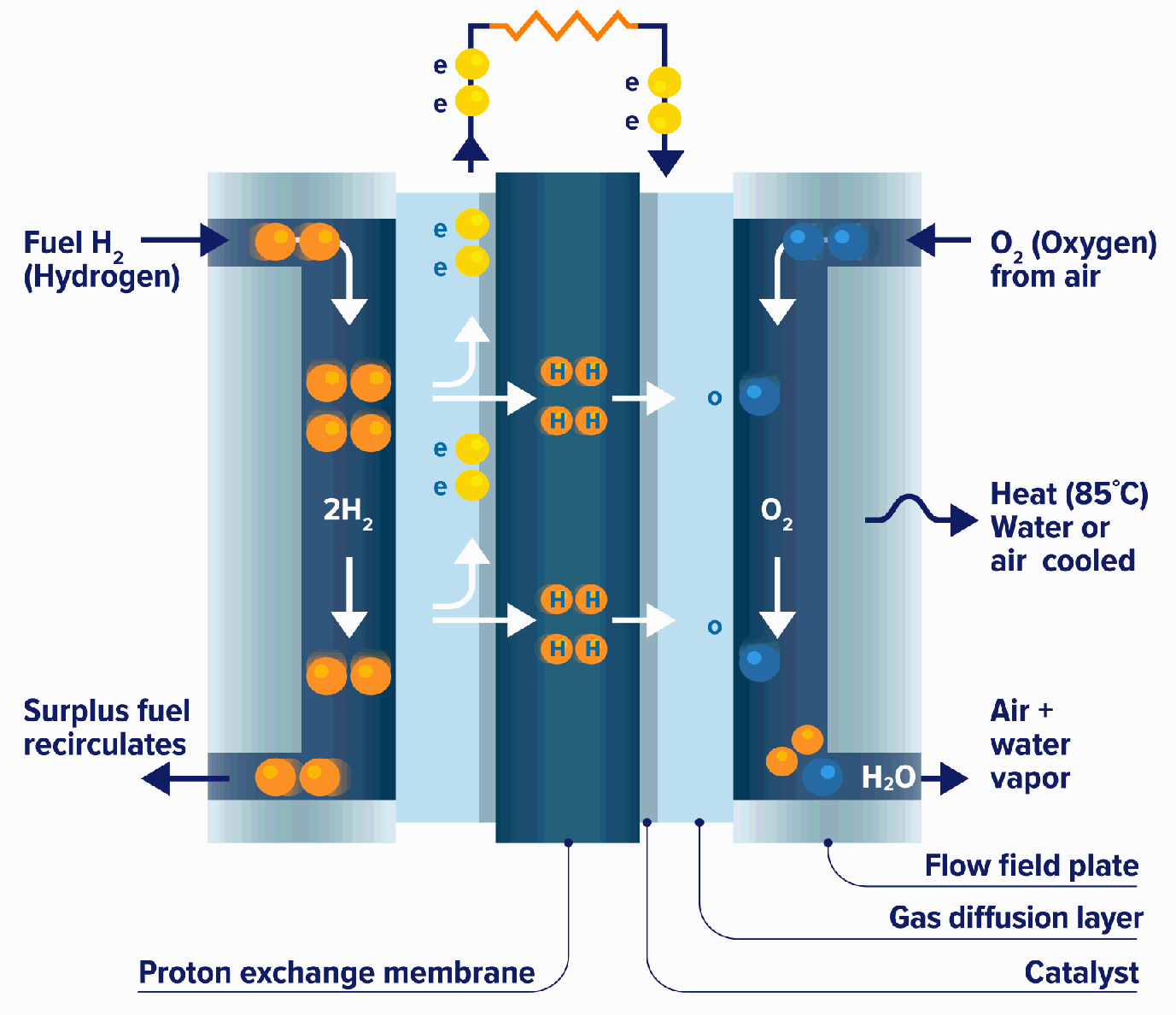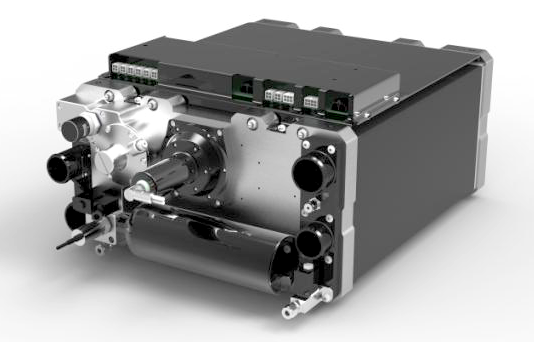|

Though
the energy density is greater for hydrogen, you then need to add the weight
of a fuel cell stack, which detracts from the apparent energy density.
Conventional batteries include the conversion mechanism.
Hydrogen
powered vehicles offer particulate free transport for cities where diesel
engines are choking the population and causing lung
cancer. There is an abundance
of clean wind and
solar energy that can produce
green
hydrogen, something
that at the moment is not happening, but will accelerate as EVs become
cheaper.
As of March 2022 Hyzon Motors has a market cap of $1.53 Billion. This makes Hyzon Motors the world's 3822th most valuable company by market cap according to recent data. Hyzon was established as a new business of Horizon
Fuel Cell. Hyzon is a global supplier of
zero-emissions hydrogen fuel cell powered commercial vehicles, including heavy duty trucks, buses and coaches.
Headquartered in Rochester, NY and with operations in Europe, Singapore, Australia and China, the company is led by Hyzon co-founders George Gu and Craig Knight, and commercializes Horizon’s 17 years of hydrogen technology development for the transport sector.
Hyzon was known as the Heavy Vehicle Business Unit (HVBU) of Horizon and was responsible for the development of fuel cell systems and the delivery of about 500 fuel cell-powered commercial vehicles during 2019 and 2020, leveraging the deep and extensive experience bolstered within the group.
Its establishment as a standalone entity was to focus on accelerating the energy transition through the manufacturing and supply of
hydrogen fuel cell-powered commercial vehicles across the North American, European, and Australasian regions. 
All
commercial fuel cells have a
similar basic configuration, an electrolyte, permeable membrane and two electrodes, but there are different types of
fuel cells based mainly on what electrolyte they use.
Fuel cells are stacked and wired in series (just like lithium batteries)
to raise the operating voltage. DECEMBER 7 2021 - Hyzon and Ricardo to deliver hydrogen fuel cell systems for commercial vehicles
Ricardo (LSE: RCDO), a world-class environmental, engineering and strategic consulting company, is partnering with leading hydrogen vehicle supplier Hyzon Motors Inc. (NASDAQ: HYZN) on developing and deploying commercial systems to support the decarbonisation of the global transport and energy sectors.
The companies announced today they will be working to combine Hyzon’s high-power-density fuel cell stack with Ricardo’s unrivaled software and controls, thermal management and proven track record advising customers on hydrogen fuel cell technology.
Hyzon, the global manufacturer of zero-emissions vehicles headquartered in Rochester, NY., is playing a critical role in driving the commercialization of hydrogen fuel cell, including through the Hyzon Zero Carbon Alliance. The company is deploying fuel cell systems into a wide variety of applications including heavy duty trucks, buses and coaches, based on the hydrogen technology developed over 18 years at parent-company Horizon.
Craig Knight, Hyzon CEO, said: “Our focus is on accelerating the energy transition through the manufacturing and supply of hydrogen fuel cell-powered commercial vehicles across the North American, European and Australasian regions. The partnership with Ricardo boosts our contributions to the energy transition, leveraging Ricardo’s holistic design and integration expertise with our fuel cell stacks.”
Marques McCammon, Managing Director, Global Automotive and Industrial for Ricardo said: “The Hyzon-Ricardo agreement illustrates the importance of collaboration to enable production-scale deployment of economical, advanced clean mobility solutions to accelerate the path to net zero emissions across all modes of transport. Collectively, we are helping our clients gain the benefits of hydrogen fuel cell technology. We are combining our expertise in vehicle control software and system integration with Hyzon’s fuel stack know-how to accelerate the decarbonisation of heavy duty vehicles by delivering high-efficiency fuel cell electric propulsion systems.”
The potential of the Hyzon-Ricardo engagement has already borne fruit with the debut of the Ricardo Vehicle Integrated Controls and Simulation (VICS) control system within the Hyzon fuel cell electric truck at the Advanced Clean Transportation conference in September. Moving forward, Ricardo will support Hyzon in a global capacity on the development and deployment of advanced energy management and propulsion systems to accelerate the realisation of net zero initiatives across all modes of transport. AUTOMOTIVE WORLD 26 OCTOBER 2021
Q&A
New ways to model fuel cell performance could greatly improve technology, says Hyzon CTO Shinichi Hirano
Hydrogen Economist, Vincent Lauerman interviewed Hyzon’s chief technology officer, Shinichi Hirano, to help ascertain the state of competition between hydrogen fuel cells and batteries in the heavy-duty truck market, as well as the outlook for its G3 Titan Stack. Hirano is 30-year veteran of automotive fuel cell technology, and led the Ford-Daimler fuel cell alliance during his 17 years with vehicle manufacturer Ford Motor Company.
Q. When are heavier duty vehicles better suited to run on hydrogen than batteries and why?
Hirano: Hydrogen fuel cell electric vehicles (FCEVs) show a significant advantage over battery power for heavy-duty and mid-duty truck applications. Hydrogen is significantly more energy dense than batteries, which is an advantage that allows for longer driving range and heavier payloads. For example, a hydrogen fuel cell powertrain is more than 2t lighter than a battery powertrain for a 500-mile range truck.
Additionally, the refuelling time of hydrogen is significantly shorter than battery charging time. This makes it appropriate for highly utilised vehicles, which run 2-3 shifts per day, leaving little downtime to charge. A hydrogen FCEV will take minutes—up to 15 minutes for a Class 8 truck—to refuel, while an EV takes hours to recharge.
Lastly, FCEVs are less sensitive to cold temperatures than battery electric vehicles (BEVs). At cold temperatures, the range of BEVs can be greatly reduced.
Q.
What is the lifespan for fuel cells compared with batteries?
Hirano: The expected lifetime for fuel cells is about 20,000 hours for a less aggressive usage profile such as steady-state operation, but fuel cell life is highly dependent on the operational profile. Hyzon is working to achieve a lifetime of 20,000 hours under a more realistic operation profile. It is difficult to make an apples-to-apples comparison with battery life, as these are measured in number of charging cycles. Q.
Do their end-of-life issues differ? If yes, how so?
Hirano: The end-of-life issues do differ. In fuel cells, the main issue is performance degradation, which gradually lowers the maximum power and efficiency of the fuel cell. A typical cause of degradation is catalyst degradation, including platinum catalyst dissolution.
Hyzon is taking multiple technical approaches to improve the lifetime of fuel cells. We are working to make our materials more robust and durable, and deploying a systemic mitigation strategy to account for stress factors and ultimately improve the lifetime without using exotic materials.
Batteries, on the other hand, lose capacity over time. In some instances, the energy density at a battery’s end-of-life is approximately half of its original density. Q.
Are there potential game-changing developments in the technology on the horizon?
Hirano: Yes. Nano-scale visualisation of fuel cells through synchrotron x-ray tomography and computational fluid dynamics techniques allows for the accessibility of detailed behaviour at the fuel cell reaction site, which is used to design the structure and material property of electrodes. This high-fidelity model-based engineering could become a game-changing advancement.
Another potential game-changer could be the adoption of artificial intelligence devices, which enable model-based control and the prediction of the future state of hydration to optimise operational conditions to avoid failures—and eventually improve lifetime and performance. Q.
At the present time the capital cost of hydrogen FCEVs is substantially higher than diesel-powered ones. What will it take to close the gap?
Hirano: Customers of commercial vehicles are conscious of the total cost of ownership (TCO) rather than the capital cost of vehicles. That TCO is primarily driven by fuel costs over the lifetime of the vehicle. Hyzon is developing fuel cell vehicle technology and access to low-cost hydrogen through local, technology agnostic production and distribution. Q.
How does your G3 Titan Stack support that effort?
Hirano: G3 is Hyzon’s next generation fuel cell technology and is designed to improve efficiency, durability and power density, to provide a carbon-neutral solution and TCO benefits to our customers. It has the highest priority in Hyzon’s R&D work.
Our G3 technology supports the fuel cell stack, cell system architecture and system controls. Utilising G3, Hyzon’s system design will be able to achieve higher power (200-310kW) at lower cost.
CONTACTS Sales contact:
Sales@hyzonmotors.com
US media relations contact: hyzon@kivvit.com
Australasian media relations contact:
Murray Newton - External Relations Manager: murray.newton@hyzonmotors.com
0433 947 150
Investor relations contact:
Darla Rivera - Senior Manager IR & FPA: IR@hyzonmotors.com
Hyzon global locations
Ricardo
Shoreham Technical Centre (Head Office) Shoreham-by-Sea West Sussex BN43 5FG UK T: +44 (0)1273 455611 E: info@ricardo.com LINKS
& REFERENCE
https://ricardo.com/news-and-media/news-and-press/hyzon-and-ricardo-to-deliver-hydrogen-fuel-cell-systems-for-commercial-vehicles
https://www.automotiveworld.com/news-releases/hyzon-motors-state-of-competition-between-hydrogen-fuel-cells-and-batteries-in-the-heavy-duty-truck-market/ https://hyzonmotors.com/
https://companiesmarketcap.com/hyzon-motors/marketcap/ https://ricardo.com/news-and-media/news-and-press/hyzon-and-ricardo-to-deliver-hydrogen-fuel-cell-systems-for-commercial-vehicles https://www.automotiveworld.com/news-releases/hyzon-motors-state-of-competition-between-hydrogen-fuel-cells-and-batteries-in-the-heavy-duty-truck-market/ https://hyzonmotors.com/
https://companiesmarketcap.com/hyzon-motors/marketcap/

Please
use our A-Z
INDEX to navigate this site
This
website is provided on a free basis to
promote zero emission transport in Europe and Internationally. Copyright © Climate Change Trust 2022. Solar
Studios, BN271RF, United Kingdom.
| 

